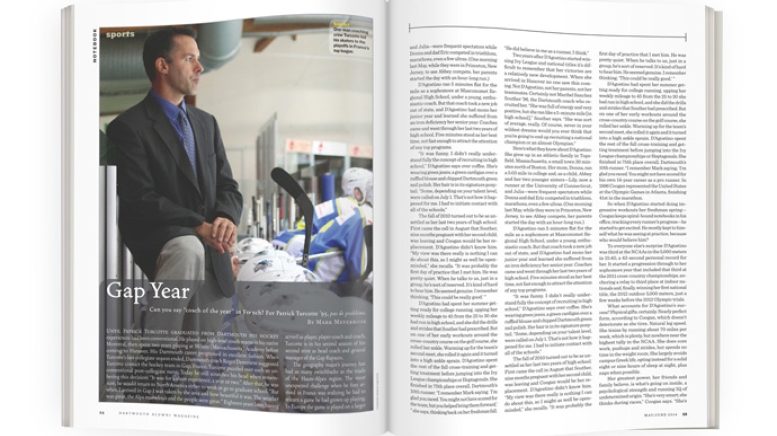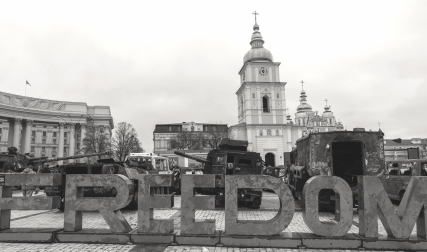Until Patrick Turcotte graduated from Dartmouth his hockey experiences had been conventional. He played on high-level youth teams in his native Montreal, then spent two years playing at Milton (Massachusetts) Academy before coming to Hanover. His Dartmouth career progressed in excellent fashion. When Turcotte’s last collegiate season ended, Dartmouth coach Roger Demment suggested Turcotte contact the hockey team in Gap, France. Turcotte puzzled over such an unconventional post-collegiate move. Today he still scratches his head when remembering this decision: “It was for a short experience, a year or two.” After that, he was sure, he would return to North America either to work or go to graduate school. “But when I arrived in Gap I was taken by the area and how beautiful it was. The weather was great, the Alps marvelous and the people were great.” Eighteen years later, having served as player, player-coach and coach, Turcotte is in his second season of his second stint as head coach and general manager of the Gap Rapaces.
The geography major’s journey has had as many switchbacks as the roads of the Haute-Alpes region. The most unexpected challenge when he first arrived in France was realizing he had to relearn a game he had grown up playing. In Europe the game is played on a larger ice surface, making for faster play and placing a premium on skating. Turcotte notes that the European game is also less physical. A forward, he had to alter his game to emphasize finesse and skill and to rely less on checking and hitting. In Europe players need to be able to “skate with the puck,” says Turcotte, versus the super-quick passing seen at the highest levels of the game in North America.
Because budgets in French professional hockey are paltry, Turcotte has no assistants and must coach alone, which makes running practices a challenge. “It’s hard to be in two places at the same time, running defensive drills while working on skills with the forwards,” says Turcotte. Back in North America, he speculates, he would have at least two assistant coaches and a general manager to help. In Gap “all the decisions are my own, and that really increases the pressure,” he says. As the Rapaces’ one-man operational staff, he’s done well: With a playoff appearance in the 2010-11 season, Turcotte won the 14-team Ligue Magnus (France’s top hockey league) Coach of the Year Award.
French teams play only half the games of an NHL team, but Turcotte works seven days a week for 10 months of the year. Although some players can live on their hockey salaries (almost all get room, board and utilities), most have other jobs. “We have one guy who is a real estate agent and another who works at an auto body shop,” says Turcotte. With players ranging in age from 18 to 36, he even has a couple of students on the team. “Many of the players have other commitments during the day,” Turcotte says, “so we have to schedule practices that are convenient for them.”
Turcotte speaks French, which helps, but with 15 “imports” on his team of 22 players—from Finland, Slovakia and the Czech Republic—language can be another obstacle. He has to spend extra time making sure each player understands his instructions. Fortunately, the season kicks off with an off-site, two-week training camp. Last August Turcotte took the team to a dedicated ice hockey training facility in the Czech Republic, where his players practiced three times a day. The focused time together proved essential to forging a team from the group of strangers.
“So far I have not had the pleasure of having Dartmouth players on my teams,” says the coach, “but I have had players from Yale, Trinity, Middlebury.” In his first year abroad Turcotte did run into Dion Del Monte ’95 while in Germany for a game. “When I walked through the rink’s parking lot I noticed a red-headed guy walking across the street,” Turcotte says. “He turned around, and it was my line-mate and roommate at Dartmouth.” Catching up led to Turcotte missing his team bus back to Gap, so he hitched a ride home with some Rapaces fans.
The primary perk of all this hard work is living in Gap, a city of fewer than 50,000 residents lying in a steep valley, with vineyards and fruit farms stretching endlessly to the south. Although the rugged peaks surrounding the city and its dry, high-mountain climate would be familiar to any resident of the Rocky Mountains, Gap is undoubtedly Old World.
For a guy who has spent much of his life in Montreal and New England, the scenic appeal of Gap is clear. When he first arrived, the hockey player was intrigued by the quirks of his new home rink, a 2,000-seat open-air arena with a roof but open sides. “We practiced only at night, when the ice would be hard,” he says. Even that first season Turcotte knew it was something special: “I felt like I was playing my own Winter Classic every home game,” he says. The rink has since been renovated and now has walls. The old charm may be gone, but the Rapaces have made a significant investment in the team’s and Turcotte’s future: He has a 10-year contract. Though he aspires to return to North America to coach, Turcotte and his wife—a native of Gap and a former member of the French national women’s hockey team—are settled raising their two children in the Alpine enclave. “No one ever leaves here it seems,” says Turcotte. “It’s the climate, I think.”
Mark Meyerrose is a freelance writer. He lives in Norwich, Vermont




